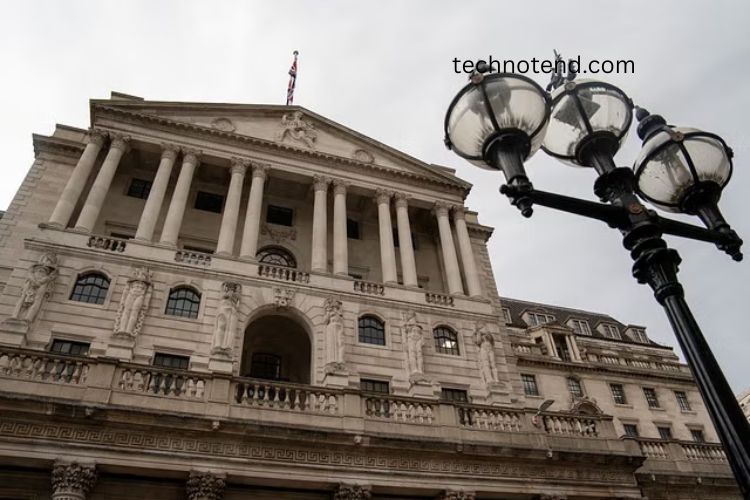The Bank of England (BoE) has decided to maintain interest rates at 4%, surprising some economists who expected a cut to 3.75% amid lower-than-anticipated inflation and a decline in job vacancies in September. Despite these encouraging economic signals, the Monetary Policy Committee (MPC) chose to keep rates steady, highlighting ongoing uncertainties in the market and ahead of the upcoming Budget.
- Why the Bank of England Held Rates
- Interest Rate Trends in 2025
- How Interest Rates Affect the Economy
- The Impact on Savers
- How Inflation Influences Mortgages and Savings
- The December MPC Meeting
- Political and Economic Reactions
- Tips for Savers in a Rate-Holding Environment
- Key Takeaways
- Frequently Asked Questions:
- Conclusion
This decision marks a temporary pause in the BoE’s rate adjustments, following three cuts earlier in the year. A fourth reduction remains possible when the MPC meets again in mid-December, depending on developments from the Autumn Budget and broader economic indicators.
Read More: http://technotend.com/uk-factories-surge-back-to-life-as-jl/
Why the Bank of England Held Rates
The MPC’s decision to hold rates stems from multiple factors. Inflation, while easing, remains above the BoE’s 2% target at 3.8%. Additionally, key sectors of the economy, including labor markets, show uneven trends. Job vacancies continue to fall, signaling caution in employment growth, while the impact of potential bond market shifts from today’s vote is unlikely to influence government fiscal planning, as the Office for Budget Responsibility (OBR) bases calculations on historical rate periods.
Economists largely agree that maintaining rates at 4% is a prudent move. It balances the need to support savers while allowing the government time to finalize its Budget strategy. Experts note that lowering rates prematurely could lead to reduced returns for savers at a time when households are already managing financial uncertainty.
Interest Rate Trends in 2025
So far in 2025, the BoE has enacted three rate cuts: February, May, and August. A fourth cut later this year would mark the first time since 2008 that five reductions occur within a single calendar year. This ongoing cycle of adjustments reflects the BoE’s strategy to manage inflation without destabilizing the economy.
Historically, the UK has experienced periods of volatile interest rates. Following a rapid rise in inflation during 2022 and 2023, rates peaked at 5.25% before the current cycle of cuts began in August 2024. Despite multiple reductions, inflation has remained stubbornly high, delaying the full economic benefits of lower rates for businesses, homeowners, and government borrowing costs.
How Interest Rates Affect the Economy
Interest rates and inflation are closely linked. The BoE uses rates as a tool to influence spending and investment. Higher rates typically discourage borrowing, reduce consumer spending, and temper business expansion. This contraction in demand helps lower inflation, guiding it toward the BoE’s 2% target.
Conversely, lower rates can stimulate economic activity by making borrowing cheaper and encouraging investments. However, cutting rates too early risks undermining savers, who earn lower returns on deposits, and can fuel inflation if demand grows too rapidly.
The Impact on Savers
For savers, today’s decision to hold rates at 4% is generally positive. Experts warn that a rate cut could trigger banks to reduce savings account returns, punishing those who have diligently set money aside. For instance, nine major banks and building societies already trimmed rates following the last base rate decision, even without a cut from the BoE.
Kate Steere, a personal finance expert at Finder, emphasizes the importance of protecting savers during periods of fiscal uncertainty. “Maintaining the base rate prevents further erosion of returns, ensuring households benefit from their savings efforts,” she explained.
How Inflation Influences Mortgages and Savings
Inflation affects both mortgage holders and savers. Rising prices increase the cost of living, which can strain household budgets. For those with variable-rate mortgages, changes in the BoE’s base rate directly impact monthly repayments. Similarly, higher inflation can erode the real value of savings if interest rates fail to keep pace with price increases.
Currently, inflation is gradually easing from its recent peaks but remains elevated. This delicate balance explains why the MPC is cautious about cutting rates too quickly, prioritizing stability while still encouraging gradual economic growth.
The December MPC Meeting
The next MPC meeting on December 18 will be crucial. Market expectations suggest a higher likelihood of a rate reduction then, depending on Budget announcements and economic data. If implemented, this cut could signal a more aggressive strategy to stimulate growth as inflation stabilizes further.
Investors and households alike are watching closely. Rate adjustments influence everything from mortgage costs and business loans to the performance of savings accounts and pension returns. The BoE’s actions are therefore closely tied to broader financial stability.
Political and Economic Reactions
The decision to hold rates has sparked reactions across political and economic sectors. Conservatives have criticized the government, arguing that sustained high rates increase borrowing costs and slow economic recovery. Meanwhile, economists highlight that the cautious approach is appropriate given current inflation trends and Budget uncertainties.
Additionally, the bond market may see minor fluctuations in response to today’s decision, but these are unlikely to affect government borrowing plans in the short term.
Tips for Savers in a Rate-Holding Environment
For those looking to maximize returns on cash, staying informed about high-interest savings accounts is essential. Rate holders can explore options such as fixed-term savings, ISAs, or competitive high-street accounts. Comparing rates across providers ensures savers can maintain or improve returns despite a stable base rate.
Polls indicate that many households are already evaluating their savings strategies in light of BoE decisions, reflecting growing awareness of the link between monetary policy and personal finances.
Key Takeaways
- BoE Holds Rates at 4%: Despite falling inflation and weaker job data, the MPC maintains the base rate.
- Savers Benefit: Holding rates protects returns, preventing further cuts by banks.
- Future Rate Cuts Possible: December’s MPC meeting could see a reduction, contingent on Budget and inflation data.
- Inflation Remains Elevated: Current 3.8% inflation continues to guide cautious monetary policy.
- Economic Stability Is Key: Balancing growth, inflation, and fiscal policy remains a top priority for the BoE.
Frequently Asked Questions:
What decision did the Bank of England make regarding interest rates?
The Bank of England decided to hold the base interest rate at 4%, choosing not to cut it despite lower-than-expected inflation and a decline in job vacancies.
Why is this decision considered good news for savers?
By maintaining the rate at 4%, savers avoid further reductions in interest earned on savings accounts. A cut could have prompted banks to lower their deposit rates, reducing returns for households.
Could interest rates be cut in the future?
Yes, the Monetary Policy Committee (MPC) will meet again in mid-December. Depending on Budget announcements and economic data, a reduction in rates is possible.
How do interest rates affect inflation?
Higher interest rates make borrowing more expensive, slowing spending and investment, which helps reduce inflation. Conversely, lower rates encourage borrowing and spending, which can increase inflation.
How does this decision impact mortgages and loans?
For those with variable-rate mortgages or loans, holding the base rate steady means borrowing costs remain unchanged. A future cut could reduce monthly repayments.
What has been the trend in UK interest rates recently?
After peaking at 5.25% during 2022–2023, the Bank of England began a series of rate cuts in August 2024. Three cuts have already occurred in 2025, bringing the rate to 4%.
How does this affect the upcoming Budget?
While bond markets may react slightly, today’s decision is unlikely to directly influence government borrowing plans, as the Office for Budget Responsibility bases calculations on previously set rate periods.
Conclusion
The Bank of England’s decision to hold interest rates at 4% offers a much-needed reprieve for savers, protecting their returns amid ongoing economic uncertainty. While inflation remains above the BoE’s target, maintaining rates balances the need for financial stability with support for households and the broader economy. Looking ahead, the December MPC meeting and the upcoming Budget could influence future rate decisions, making it essential for savers, borrowers, and investors to stay informed. By understanding how interest rates interact with inflation and personal finances, individuals can make smarter financial choices in a shifting economic landscape.













